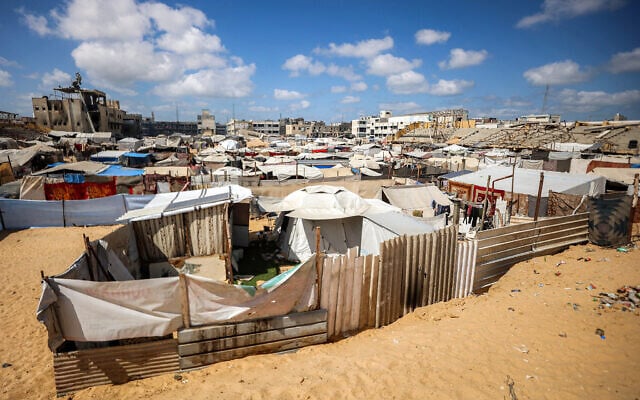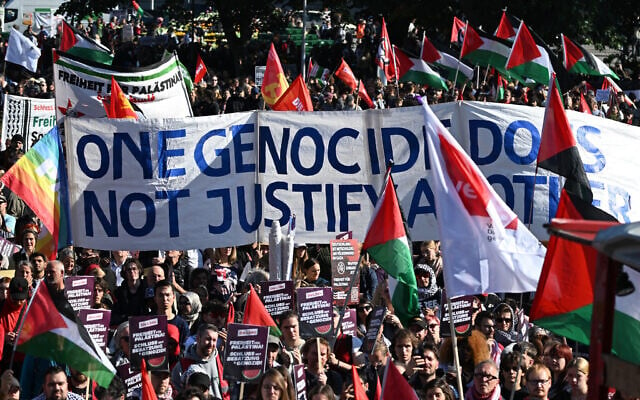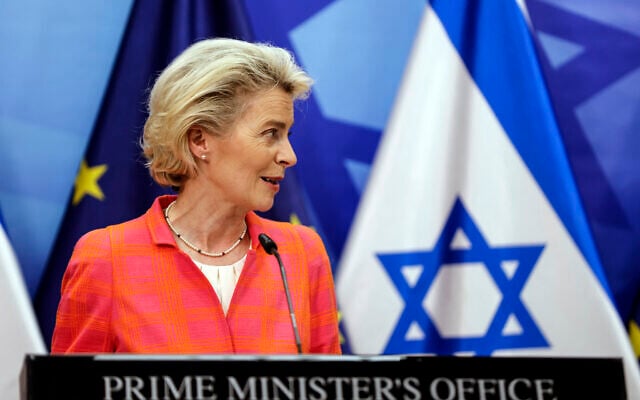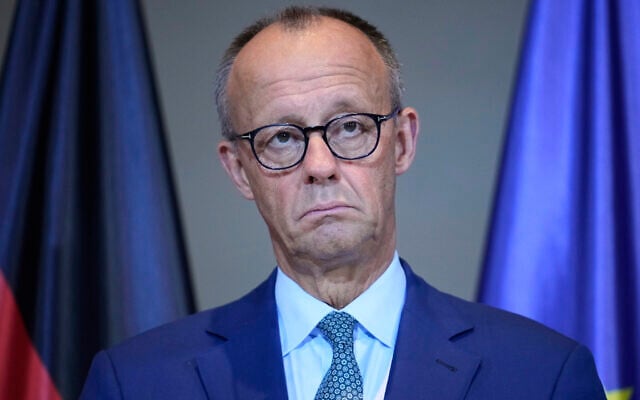

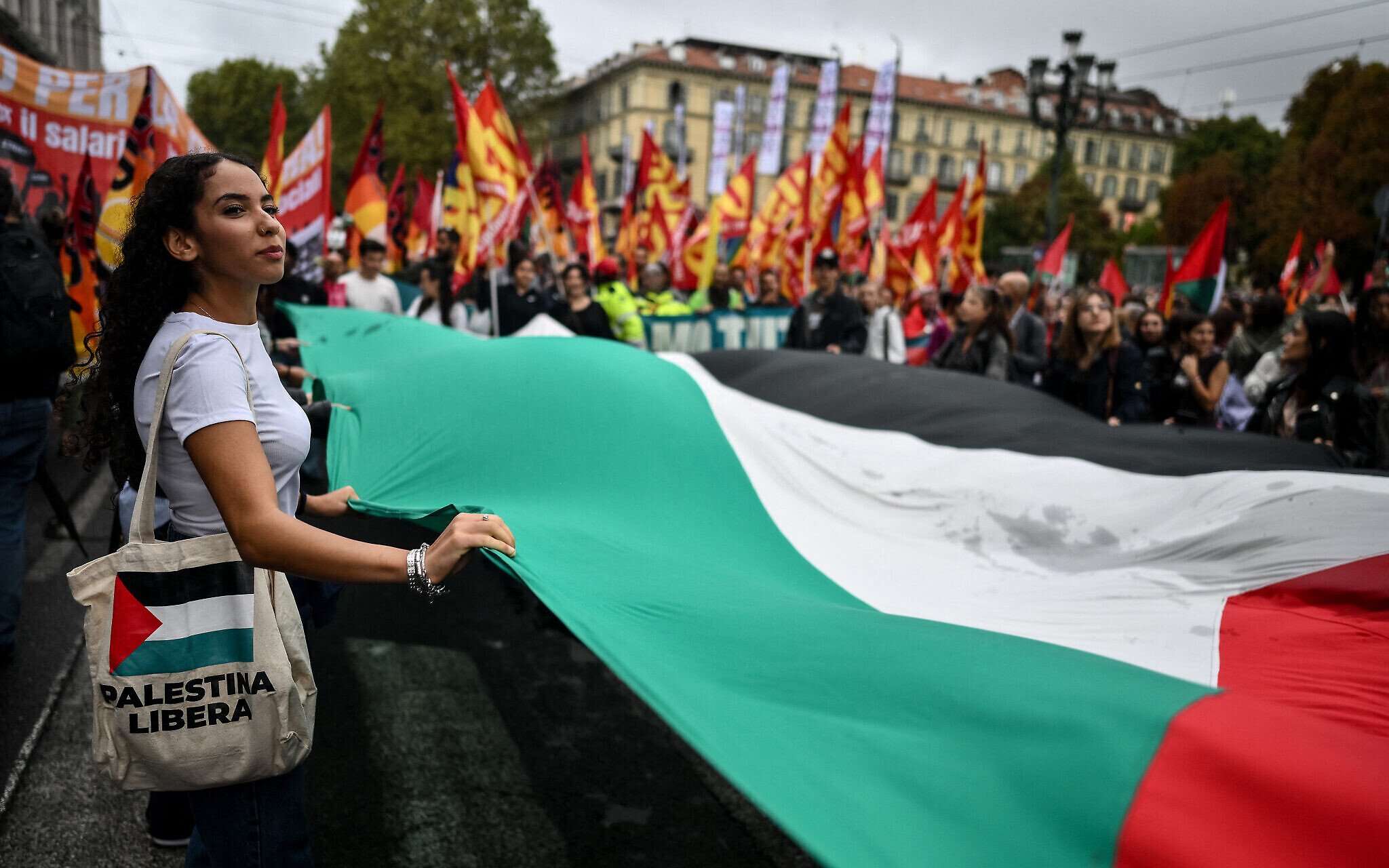
BRUSSELS, Belgium — Pro-Palestinian, anti-Israel protests are shaking major European cities, and calls are growing to ban Israel from sporting and cultural events. European navies have been deployed to protect activists trying to get aid into Gaza, and a wave of countries have done the once-unthinkable and recognized a Palestinian state.
As outrage over the humanitarian catastrophe grows, more European leaders, sometimes driven by pressure from their populations, have openly condemned Israel’s war conduct and sought to push Prime Minister Benjamin Netanyahu’s government to agree to a ceasefire and allow in further aid.
“There has been a ground-breaking shift in Europe where, somewhere over the last year, populations have been putting more pressure on their governments, which has helped break taboos at the top over criticism of Israel,” said Sanam Vakil, director of the Chatham House think tank’s Middle East and North Africa program.
Italian Prime Minister Giorgia Meloni, one of Israel’s closest EU allies, said last week that she would support European Union sanctions against Israel. It was her toughest position yet, and followed a nationwide strike in Italy and anti-Israel protests from Palermo to Milan.
Speaking at the UN General Assembly in New York, Meloni said: “Israel ended up violating humanitarian norms, causing a massacre among civilians.”
The war erupted on October 7, 2023, when Hamas-led terrorists murdered some 1,200 people, mostly civilians, and took 251 hostages, 48 of whom remain held in Gaza.
The Hamas-run Gaza health ministry says more than 66,000 people in the Strip have been killed or are presumed dead in the fighting so far, though the toll cannot be verified and does not differentiate between civilians and fighters. Israel says it has killed over 22,000 combatants in battle as of August and another 1,600 terrorists inside Israel during the October 7 onslaught.
Israel has said it seeks to minimize civilian fatalities and stresses that Hamas uses Gaza’s civilians as human shields, fighting from civilian areas including homes, hospitals, schools and mosques.
The war has also destroyed vast areas of Gaza, displaced around 90 percent of Gaza’s population and caused a catastrophic humanitarian crisis.
Pro-Palestinian, anti-Israel protests have grown, according to the Armed Conflict Location & Event Data Project, or ACLED, which monitors worldwide conflicts. From December to April, there were 780 protests across Europe. That has grown to 2,066 in the last five months, an average of at least 15 a day, said researcher Ciro Murillo.
The protests cut across parties and include members of Europe’s large Muslim communities, an important voting bloc in countries like France and Germany.
In the past six months, there were only 51 pro-Israel protests in Europe, about half of them in Germany. ACLED data showed a steep drop in public support for Israel starting a few months after the war began.
Speaking at the UN two days after Meloni, Netanyahu seemed to acknowledge the turn.
“Sure, in the days immediately following Oct. 7, many…supported Israel. But that support quickly evaporated when Israel did what any self-respecting nation would do in the wake of such a savage attack,” he told world leaders. “We fought back.”
With a shared birth in the aftermath of World War II, Israel and the European Union are intricately interwoven.
Almost all Jewish Israelis trace their heritage to either the broader Middle East or the Jewish communities of Europe laid waste to by pogroms in the Russian empire and the genocidal Third Reich of Germany.
“Israel is from Europe, and anyone who fails to admit it or understand it doesn’t really understand this country,” said Sharon Pardo, a professor at Ben-Gurion University and author of a book on European-Israeli relations, “Uneasy Neighbors.”
Strategic practicality drove Israel towards Europe, even if many considered it “a continent of murderers,” Pardo said. Israel’s first prime minister, David Ben-Gurion, began building long-standing economic, political and cultural ties with Europe. Today, the EU is Israel’s top trading partner.
“These were the immediate markets for Israeli agriculture; this was the market for weapons for Israel,” Pardo said.
But the embrace by Netanyahu, Israel’s longest-serving prime minister, of far-right European parties has antagonized the European political establishment.
“Netanyahu’s Israel is an anti-European Union country, a Euro-skeptic country that does its utmost to harm the European integration project,” Pardo said.
The shocking violence of October 7, 2023, ignited an outpouring of support from European leaders.
Ursula von der Leyen, the EU’s political chief, visited a still-smoldering kibbutz days later and met with Netanyahu. She pledged EU support for Israel.
But nearly two years later, Foreign Minister Gideon Sa’ar accused her of “empowering a terrorist organization” with her surprise call for the EU to increase pressure on Israel to halt the war.
Von der Leyen said there’s been “a more systematic shift in the last months that is simply unacceptable” in the conflict and that “Europe needs to do more.”
She was likely influenced by growing protests and by EU staff critical of her policies, said Lisa Musiol, head of EU Affairs for the International Crisis Group. She pointed to open letters criticizing the EU’s Gaza policy signed by more than 2,000 current EU staffers and 390 former European ambassadors and officials.
Von der Leyen proposed increasing EU tariffs on some Israeli goods and sanctioning some Israeli settlers and two members of Netanyahu’s cabinet. She would also sanction 10 Hamas leaders. EU leaders were to discuss the proposals on Wednesday in Copenhagen.
Major EU measures require unanimity — a likely impossibility in the 27-nation bloc — but some can be passed with a vote weighted by population. That would require Italy or Germany to join nations critical of Israel.
Germany’s support for Israel is second only to that of the United States. But Germany’s ruling coalition is split on Gaza, with Chancellor Friedrich Merz’s center-right Christian Democrats supporting Israel and the smaller Social Democrats more critical of the war.
Merz has spoken to Netanyahu about his growing concerns and has curbed arms sales to Israel, but said he is not considering sanctions.
Germany’s historical responsibility for the Holocaust has shaped its postwar support for ensuring Israel’s security and combating antisemitism. Still, tens of thousands of protesters took to the streets of Berlin on Saturday, calling for the war’s end.
More likely to swing the vote would be Meloni, who has said she supports Italy joining recent moves to recognize a Palestinian state by European neighbors France, Andorra, Belgium, Luxembourg, Malta, Monaco, the United Kingdom and Portugal, as well as Commonwealth nations Canada and Australia.
In contrast to Germany, Italy has a different historical relationship to Israel, said Elisabetta Brighi, a University of Westminster professor. Deeply influenced by the country’s strong trade unions and the Vatican, Italy could switch and join European efforts to pressure Israel over Gaza.
“Italy has not translated the trauma of fascism the same way that Germany has,” she said.
Italy has joined Spain in sending navy ships to protect a flotilla of boats carrying activists seeking to break Israel’s blockade of Gaza after the activists said they were attacked by drones near Greece.
Calls have also grown to ban Israel from some sporting and cultural events, with Spanish Prime Minister Pedro Sanchez saying after protesters disrupted the Spanish Vuelta cycling race last month that Israel should be excluded until the “barbarity” in Gaza ends. Some countries have also threatened to boycott the Eurovision Song Contest — hugely popular in Israel and Europe — if Israel is allowed to compete.


